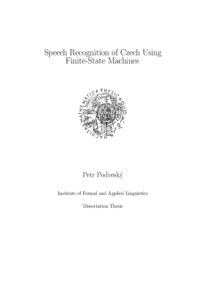Speech Recognition of Czech Using Finite-State Machines
Speech Recognition of Czech Using Finite-State Machines
rigorózní práce (UZNÁNO)

Zobrazit/
Trvalý odkaz
http://hdl.handle.net/20.500.11956/4860Identifikátory
SIS: 44463
Katalog UK: 990015380190106986
Kolekce
- Kvalifikační práce [11981]
Autor
Fakulta / součást
Matematicko-fyzikální fakulta
Obor
Teoretická informatika
Katedra / ústav / klinika
Ústav formální a aplikované lingvistiky
Datum obhajoby
20. 12. 2006
Nakladatel
Univerzita Karlova, Matematicko-fyzikální fakultaJazyk
Angličtina
Známka
Uznáno
Speech recognition has become a thriving field with many real-life applications. Voice dialing in cell phones, voice control in embedded devices, speech-driven interactive manuals and many other utilities rely on solid speech recognition software. We believe that research in speech recognition can boost performance of many applications related to the area. The thesis concentrates on automatic large-vocabulary continuous-speech recognition of Czech. Czech differs from English in a few aspects. We focus on these differences and propose new language-depended techniques. Namely rich morphology is investigated and its impact on speech recognition is studied. Out-of-vocabulary (OOV) words are identified as one of the major sources deteriorating recognition performace. New language modeling techniques are proposed to alleviate the problem of OOV words. The proposed language models are tested in speech recognition systems on diverse speech corpora. The obtained results validate the original approach to language modeling. Significant overall speech recognition improvement is observed.
